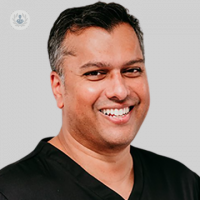I'm 46 years old, what are my options for correcting my vision?
Written by:For those who are middle-aged or older and wear distance and reading glasses, the good news is that your vision can be corrected. Whilst it is commonly assumed that laser surgery is the best option for improving vision in those in their fifties, the treatment options are much more diverse than people believe.
Here, one of our top ophthalmologists and co-founder of private eye clinic LaserVision, Mr Rakesh Jayaswal explains the procedures that are available when it comes to correcting eyesight.

Why do you think that eyesight diminishes as we age?
With modern lifestyles, particularly with the overuse of mobile phones, we are used to varying our point of focus from near-to-far in an instant.
At the age of 45, the natural lens within the eye loses its functionality and becomes more rigid. This leads to a condition known as presbyopia (or ‘ageing eye’), where people may notice that objects and text that are held close by become more blurred resulting in the need for reading glasses.
What are the options for correcting my vision?
When it comes to reducing dependence on glasses, one option is called monovision (or ‘blended vision’). This is where the vision in your dominant eye is corrected for distance vision and your other eye is purposefully left somewhat near-sighted so that you are able to see objects that are close.
Both eyes work together and allow you to see clearly both near and far. However, not everyone can adapt to monovision and it is therefore tested using contact lenses before you would commit to having the laser eye surgical procedure.
What happens if I am not suitable for monovision?
If you are unable to adapt to monovision after being tested, then lens exchange (also known as lens replacement or refractive lens exchange) is an excellent alternative. Modern intra-ocular lens designs allow for vision to be corrected at far, intermediate and near through the use of trifocal lens technology.
The procedure is very similar to cataract surgery, which is one of the commonest eye operations in the world. The use of premium lens technology allows for vision to be fully restored. Lens replacement is a proven, permanent procedure that can correct either long or short sight and astigmatism.
If you would like to discuss your vision-correcting options, then do not hesitate to book an appointment with Mr Jayaswal for a first consultation.


